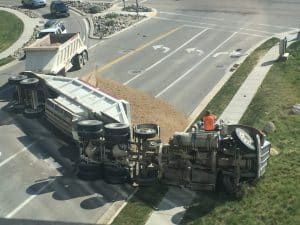The Dangers of Truck Cargo Shifts and Spills
 Transporting cargo is the lifeblood of the American economy. Consumers and businesses nationwide rely on trucks to deliver energy products, timber, chemicals, machines, equipment, consumer goods, food, and everything that people across North Carolina and the country use. The types of trucks that deliver cargo include tractor-trailers, semis, rigs, box trucks, tankers, vans, dump trucks, flatbeds, and other trucks.
Transporting cargo is the lifeblood of the American economy. Consumers and businesses nationwide rely on trucks to deliver energy products, timber, chemicals, machines, equipment, consumer goods, food, and everything that people across North Carolina and the country use. The types of trucks that deliver cargo include tractor-trailers, semis, rigs, box trucks, tankers, vans, dump trucks, flatbeds, and other trucks.
There are laws that regulate the weight of the cargo being transported and how the cargo should be loaded so it doesn’t move or spill while the truck is in operation. There are also industry standards for how to secure cargo while the truck is making its deliveries. When cargo shifts, the truck driver can easily lose control of the truck, causing the truck to veer into other lanes, collide with vehicles on the road, roll over, and create dangers for everyone near the truck. When cargo spills, the spill can create havoc for anyone in its path.
When truck drivers lose control of their trucks due to shifting cargo or cargo spills occur, the driver and others nearby may suffer severe injuries and deaths. Cargo spills are especially dangerous and deadly when the cargo contains hazardous materials.
What rules govern loading cargo securely?
The Federal Motor Carrier Safety Administration (FMCSA) and the Occupational Health and Safety Administration (OSHA) have specific rules for loading cargo and securing the cargo depending on the type of truck and other factors. These rules help ensure that the cargo doesn’t move around while the truck is in operation and doesn’t spill out of the back or sides of the truck. For example, there are rules that govern what number of tie-downs should be used to secure the cargo and how liquids and gases should be secured.
In addition to the FMCSA rules and OSHA rules, states may have their own rules. Each industry also has acceptable standards.
Some of the different industries that have different safety rules for loading cargo include:
- Timber, lumber, logs, and similar products
- Agricultural products
- Machines and equipment used for manufacturing and construction
- Metal coils
- Cars, trucks, and motorcycles
- Crushed items
- Cement
- Various types of containers
- Oil and petroleum products
- Chemical products
- Electronic products
- Consumer products
- Delivery of local consumer products
Why are cargo shifts and spills so dangerous?
Many truck drivers drive their trucks at the speed limit or even above the speed limit. Even a minor shift of the cargo can cause a driver to lose his/her focus or control of the vehicle. This momentary lapse can cause the driver to fail to stop in time, to speed, to cross into other lanes as the driver seeks to gain control, to fail to appreciate any blind spots, and to otherwise fail to maneuver the truck properly.
When cargo spills:
- The truck driver can lose control of the vehicle during the spill. Trucks may even jackknife or roll over during the spill.
- The cargo can spill directly onto another driver, a construction worker on the side of the road, or anyone near the spill.
- The spill will likely cause drivers in the path of the spill to slam on their brakes or to try to avoid the cargo which can cause collisions with the truck itself, other vehicles, or objects on the road.
- Create a nightmare for every driver near the spill as the truck and cargo take up several lanes of the highway.
Just one spark can create an inferno. HAZMAT spills are especially dangerous because the products may be highly flammable and consist of lethal gases and deadly corrosives.
Why does cargo shift, fall, or spill?
Our skilled Charlotte truck accident lawyers work with investigators, federal and state officials, local law enforcement, and industry experts to help show why the cargo shifted or spilled. Some of the reasons cargo moves or spills include:
- Failure to secure the load properly according to safety laws and industry standards.
- Defective equipment such as fault tie-downs cables, chains, and straps.
- Overloading the truck, causing the truck to be top-heavy or for the balance of the truck to be affected. Overloads are a main cause of truck rollovers and jackknives. Trucks with too much weight also increase the risk of tire blowouts.
- Vulnerability to high winds and rains. Exposed cargo should be secured to minimize movement due to weather conditions. Flatbeds are especially vulnerable to the elements.
- Improper balancing. The cargo should be balanced so that it doesn’t move when a truck driver turns or needs to accelerate or decelerate quickly.
Who is liable for shifting or spilled cargo accidents in the Charlotte region?
Many different people and companies may be responsible for your injuries or the death of a loved one when cargo accidents occur. The possible defendants may include:
- The truck driver
- An employer of the truck driver
- The company that requested the shipment
- A broker that arranged the shipment
- A company that was hired to load the truck securely
- Other drivers on the road who caused the accident
If any of the tools and equipment used to secure the cargo were defective, the manufacturers of the defective products may be strictly liable. The North Carolina Department of Transportation and other state agencies or entities may be liable if poor road design or maintenance contributed to the truck accident.
Cargo shift and cargo spill accidents are very complex cases. There are often multiple defendants. The injuries are often quite serious. Many times, we need to file wrongful death claims because a loved one died. At Price, Petho & Associates, we have the experience and resources to represent victims and families when cargo accidents happen. We’ll fight for all the economic and personal damages you deserve. Call our office now or complete our contact form to schedule a free initial consultation today. We meet clients in Charlotte, Rutherfordton, and Rockingham.

Attorney Doug Petho is the owner and founder of Price, Petho & Associates. His primary focus is the litigation of plaintiff’s personal injury suits, and he has successfully tried hundreds of cases to jury verdict involving car accidents, trucking accidents, pedestrian accidents, slip and fall accidents, and work-related accidents. Contact his office in Charlotte today.
